Authors José de Segovia and Pablo Martínez presented the message of the Gospel to the audience. Other cities also commemorate Reformation with different events.
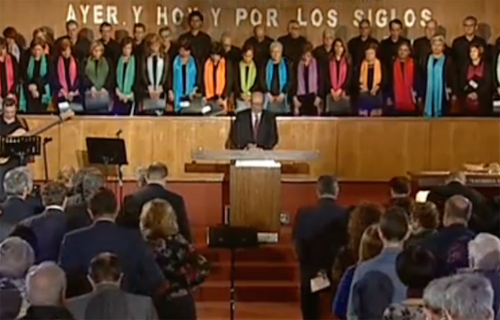 The Reformation worship service. / TVE
The Reformation worship service. / TVE
For the first time ever, the national Spanish public television TVE (Televisión Española) broadcast a Reformation worship service in which different speakers remembered what happened in Europe 498 years ago, and explained what that it means to evangelicals today.
The United Choir of Madrid opened the celebration, singing classic traditional hymns and more modern songs as well.
José Pablo Sánchez, the director of the evangelical program of the Spanish national TV “Buenas Noticias” (Good News in Spanish), presented the event, introducing each participant.
“The Reformation was a movement with many faces and ideas. In our country, it was hidden and distorted”, Sánchez regretted, and, at the same time thanked the national television for the opportunity of broadcasting the service to the whole country.
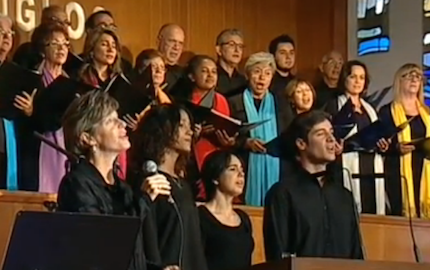 The choir sang several hymns and songs. / TVE
The choir sang several hymns and songs. / TVE
SOLA SCRIPTURA
Theologian and journalist José de Segovia made a summary of the Reformation's history and principles. “In the Eve of All Saints, when we are so aware of death, Martin Luther published his 95 thesis, where he shows the freedom of the divine grace”, the theologian explained.
“Luther and others rediscovered the message of Grace”, Segovia affirmed, while he remembered that “all the same elements that contributed to the appearance of the Reformation were present in Spain”, but it was almost suppressed “by the Inquisition”. “Their suffering gave testimony of this truth”, the journalist added.
“The Reformation message is described by its first principle: Sola Scritpura, because it is a challenge to discover the truth by ourselves”, Segovia manifested. “It is there where we find a God full of grace, who receives each one of us, just like we are”, he continued.
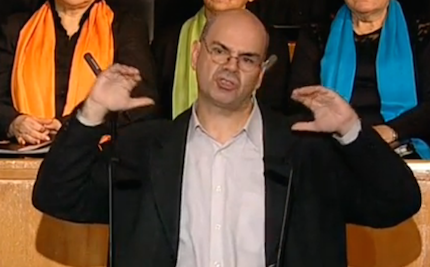 José de Segovia. / TVE
José de Segovia. / TVE
The encounter with God is “by faith in Jesus Christ. The reformers talked about Jesus' merits, and they found that Jesus had done everything”. Because of that, the Spanish reformers sacrificed their lives.
“Truth could not be incarcerated or be silenced with the Inquisition´s bonfires, they had found their eternal freedom in Christ”, Segovia commented.
“It is only Christ who unites so many different people in many movements since then”, he explained, pointing out the differences between the church and the Lord of the church.
“The world is not interested in the church at all today, but Christ is still popular, and that is the Reformation's aim. The glory of Jesus is what captivates the heart up to the point of giving up ambitions, illusions and dreams for Him”, Segovia concluded.
THE MOST IMPORTANT TWEET EVER
Psychiatrist and international author Pablo Martínez was the next speaker. “The righteous shall live by faith”, he recalled in his message.
“That was the verse which changed Luther´s life, so short that it could have been a tweet. Actually, it could be the most important tweet of your life, it is the deepest short message you will be able to find”, Martínez affirmed.
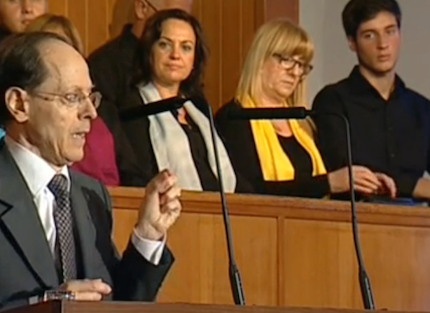 Pablo Martínez Vila. /TVE
Pablo Martínez Vila. /TVE
“Faith is not believing in something, but in someone. In whom do we believe? The recipient of the Christian faith is a personal God, revealed in the Word and incarnated in Christ. It is not an impersonal force, believing is much more than just having a belief”, he explained.
According to Martínez, this faith has 3 steps. The first is knowing Jesus, someone who “is not an ideology or a religion”, but looks for a personal relationship. To know him, Martínez said, it is necessary “to go to his verbal revelation in His Word.”
Secondly, faith in Christ implies trusting in Him. “Faith is discovering the grace of God in Christ, and hold on to it”, to “discover that not only Christ died, but He died for me.”
Finally, it is a committed faith, “by faith I respond to God' love, that is why Christianity is opposed to religion: religion is the effort of men to reach God, but the truth is God's effort to reach men, the grace of Christ on the cross in the faith´s climax.”
Martínez concluded stating that “faith generates authentic life, it is a promise of life, of hope, in the middle of so much darkness. Faith is essential for life, it gives us plenitude.”
MUSIC THROUGHOUT THE EVENT
At the end of the event, the internationally known singer Marcos Vidal interpreted the song “I was blind”, a personal testimony of how much someone is transformed when we he gets to know Jesus.
The United Choir of Madrid closed a service which gathered dozens of people in an historic event for the Spanish evangelical community.
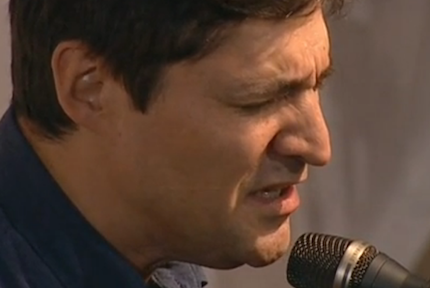 Marcos Vidal. / TVE
Marcos Vidal. / TVE
CELEBRATIONS IN OTHER SPANISH CITIES
In Girona, Catalonia, 290 people gathered to celebrate Reformation Day in an institutional act. It was the first time that local authorities came to an event like this, which aims “to present the Protestant community to the people of Girona, because we are not very known yet”, according to Jaume Torrado, of the Catalonian Evangelical Council.
Other important event to commemorate Reformation, took place in Seville, in the south of the country. A concert by the classical chamber music group called “Esemble Bohórquez”, in honour of one of the Spanish Protestant martyrs. The group is formed by 15 young musicians who play wind and string instruments.
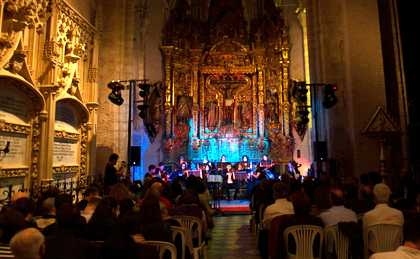 The Bohórquez ensemble playing Reformation music in a old Roman Catholic church in Sevilla. / Reforma Quinto Centenario
The Bohórquez ensemble playing Reformation music in a old Roman Catholic church in Sevilla. / Reforma Quinto CentenarioThis was the first concert, where they played works of Bach, Haendel and Mendelssohn, along with a selection of hymns from the beginning of the Reformation until the twentieth century, all accompanied by a narration explaining the historical development of the Protestant music, its importance, and its stylistic and thematic evolution. The group plans to give several concerts to make the music of the Reformation known.

Las opiniones vertidas por nuestros colaboradores se realizan a nivel personal, pudiendo coincidir o no con la postura de la dirección de Protestante Digital.
Si quieres comentar o